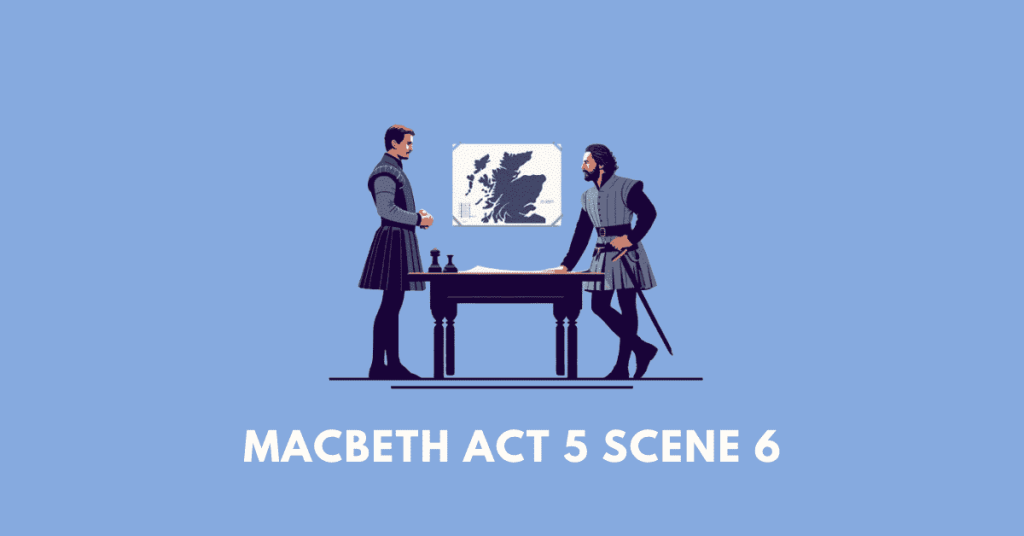Get notes, workbook solutions, summary, questions and answers, and pdf of the drama/play Macbeth (Act 5 Scene 6) by William Shakespeare, which is part of ISC Class 12 English. However, the notes should only be treated as references, and changes should be made according to the needs of the students.
If you notice any errors in the notes, please mention them in the comments
Summary
This brief yet impactful scene sets the stage for the final battle between Malcolm’s forces and Macbeth’s remaining troops. The atmosphere is charged with anticipation as the two armies prepare for a decisive confrontation.
Malcolm, displaying strategic leadership, divides his forces into two sections. He assigns command of one section to Old Siward and his son, while he and Macduff lead the other. This division demonstrates a well-coordinated plan of attack against Macbeth’s stronghold at Dunsinane.
The scene culminates with the sound of trumpets blaring, signaling the commencement of the battle. The trumpets symbolize the call to arms and foreshadow the bloodshed and chaos that will ensue as the two sides clash in a struggle for power and justice.

Video tutorial
Workbook answers
Multiple Choice Questions
1. The leafy screens are the
a. Boughs of the Birnam Wood
b. Beautiful sunscreens
c. Fans made of leaves
d. Green hand fans
Answer: a. Boughs of the Birnam Wood
2. Old Siward will lead the battle with
a. Macduff
b. Donalbain
c. His worthy son
d. Malcolm
Answer: c. His worthy son
3. MacDuff gives orders for
a. The trumpets to be sounded
b. Charging at Macbeth
c. Retreat from the battlefield
d. To unsheathe their swords
Answer: a. The trumpets to be sounded
4. The meaning of harbingers is
a. Soldiers
b. Messengers
c. Fiends
d. Ghosts
Answer: b. Messengers
5. Fill in the blanks in the following lines: Make all our……..speak; give them all…….. Those……………harbingers of ……..and death.
Answer: trumpets; breath, clamorous; blood
Context questions
1. Siward: Fare you well. Do we but find the tyrant’s power to-night, Let us be beaten, if we cannot fight.
a. Explain the above lines. What do the lines portray about Siward as a general of the English forces?
Answer: Siward expresses a determination to confront the tyrant’s forces before nightfall, highlighting his resolve and strategic intent. His statement suggests a readiness to accept defeat only if they are incapable of fighting, emphasizing his courage and leadership qualities. This portrayal reflects Siward’s pragmatic approach to warfare and his commitment to challenging tyranny, underscoring his valour as a general of the English forces.
b. What orders does Macduff give after this extract?
Answer: Macduff orders for the trumpets to be sounded, commanding them to announce the fight with their loud and clamorous blasts. This action signifies the commencement of battle, serving as a herald of impending bloodshed and death.
c. Describe the scene of the battlefield.
Answer: The battlefield is depicted as a scene of intense preparation and impending conflict, situated outside the castle of Macbeth. The forces, led by Malcolm, Old Siward, and Macduff, are strategically positioned and ready to launch an attack. The scene is charged with a sense of urgency and determination, as the trumpets sound the onset of battle, marking the transition from planning to active engagement against the enemy.
d. Give the meanings of:
i. right noble
Answer: “Right noble” is an expression used to describe someone of high moral qualities or nobility, often implying not just noble birth but also noble character. It signifies a person who is both honorable and esteemed, deserving of respect and admiration for their virtues and standing.
ii. clamorous
Answer: “Clamorous” refers to a loud and persistent noise or demand. It is often used to describe a loud, noisy, or vociferous outcry or protest, where there is a significant level of sound or vocal expression, demanding attention.
e. Why is there an emphasis on trumpets to be sounded? What do they signify?
Answer: The emphasis on sounding the trumpets serves multiple symbolic and practical purposes in the context of battle. Trumpets are traditionally used to signal the start of a military engagement, to marshal troops, and to communicate commands across the battlefield. In the extracts provided, the sounding of the trumpets signifies the call to arms, rallying the forces for the imminent battle and signaling the readiness to confront the enemy. It also serves as a harbinger of the approaching conflict, with the clamorous sound heralding bloodshed and death. The loud, resonant blasts of the trumpets thus encapsulate the gravity and urgency of the moment, rallying the troops for the decisive confrontation with Macbeth’s forces.

Get notes of other boards, classes, and subjects
